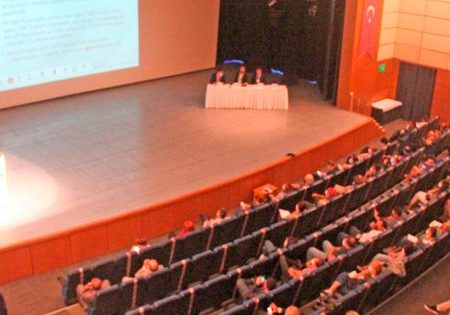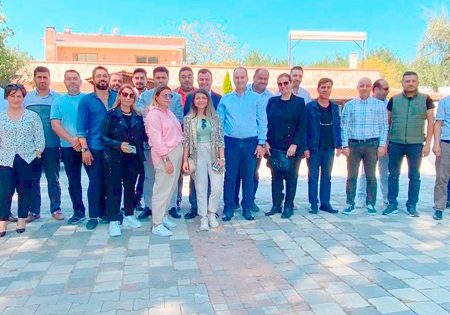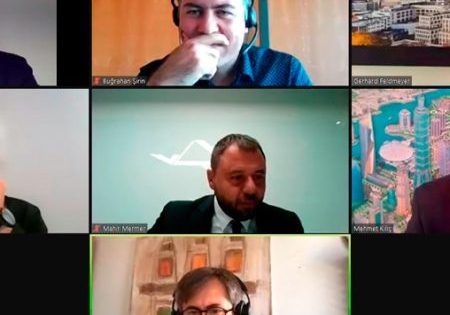I used the same sentence in one of my articles in this column before, if you remember. I highlight it again: “The ballot box brought in front of the voters in every electoral period is actually a step toward the future taken by the voters.” When the voters make a decision about the politicians who are prospective rulers of the country, they also state that they agree with their political party, personality and education, as well as his opinions and projects for the future. They anticipate these representatives they elect will meet their expectations. I believe that if the number of voters who go to polls with such awareness increases, the Turkish people will not have a concern for the future.
But, let’s be honest and ask: Is this the case with the voters?
While we wait for the future we choose, we should be aware of the fact that today is what we’ve waited for. What do you think is the main source or the reason for the troubles experienced, where there are deeper economic difficulties, and the rich get richer while the poor get poorer, and the middle class disappears? Could it be our decision in the latest election? For me, we all have to make self-criticism. If the future we dreamed of when we voted in the previous election is the Turkey we live in today, I have nothing to tell you, but if not, it’s time to rethink. As long as we do not and cannot do it, Turkish people will experience more losses and impoverishment which, unfortunately, is inevitable because Turkey is not a developed country where we may live a debauched life. Truth is bitter; due to the choices of the voters and their future expectations, Turkey cannot make progress when compared with the others, and thus gets poorer and poorer.
The future we choose!
By Christiana FIGUERES and Tom Rivett CARNAC
I recommend you read the book written by two authors who organized the Paris Climate Conference in 2015 in order to draw attention to the most important crisis in the history of humanity, and to find a solution. I also want to share some important points mentioned in the book.
Climate change is one of the most important agenda topics of recent years, although it is not highlighted in Turkey. On one hand, there are deniers who state that they do “not believe in” climate change, including Donald Trump, the former United States president. Turkey recently approved the climate change agreement after six years. In fact, denying climate change is same as saying we do not believe in gravity. Climate change is a scientific fact; it is not a belief, religion or an ideology. It is based on measurable and verifiable facts. Climate crisis affects all of us, whether we believe it or not, no matter where we were born or where we live. Moreover, the irresponsibility of “not believing in climate change” shows its darker side more and more with every new disaster.
According to the authors, there are two scenarios:
First Scenario: We are in 2050
The Earth we created gets 3 degrees warmer than before. Unless the governments, companies and the global community do more than recorded in 2015, the Earth will get 3.7 degrees warmer by 2100. Warming will reach 4-5 degrees if the commitments are not fulfilled. We are rapidly moving toward a world where there are no controls other than the emission restrictions in 2015, and it will be 3 degrees warmer in 2100. Here are its critical influences and results:
- Your eyes often get watery.
- Your cough does not stop.
As storms and heat waves come one after another, air quality and ozone pollution is dangerous without special masks, which are only available to those who can afford it. Some countries try to get rid of air pollution through cloud seeding and producing rain but the results are variable. Now, all eyes are on the west Antarctic ice sheet. When it melts, freshwater will start flowing into the oceans and the sea level will rise more than 5 meters.
Water gets more acidic as the oceans absorb carbon dioxide. pH levels are so cruel to marine life that international fishing is banned almost everywhere, except for by a few countries.
Temperature increases gradually. If you live in Paris, you have to resist 44 degrees in the summer. Moreover, it is not a headline as it was thirty years ago, but a kind of new normal. The amount of snow that turns into ice on the mountaintops in winter decreases so much that melting does not occur in spring and summer. Communities who have limited resources have already begun to face the challenges of water scarcity: Denominational violence, mass migrations and deaths.
In almost all public facilities, taps are locked and the toilets are used by inserting coins. There are not enough long-lasting products to feed the population. As a result, food riots, coups and civil wars devastate the world’s most vulnerable areas. Developed countries try closing their borders to mass immigration while they also face its consequences. Stock markets collapse and currencies fluctuate wildly. The European Union becomes history.
Since the states want to keep their wealth and resources to themselves, they employ drastic solutions to keep people out of their borders. The armies of many countries are now like military-equipped border patrols.
Second Scenario
Since 2020, we achieved reducing emissions by half in every decade. Temperature will not increase more than 1.5 degrees by 2100. In many parts of the world, the air is clean, even in cities. Staying out is like walking in a verdant forest. We are grateful to the trees; fortunately, there are trees everywhere.
As the flight speeds were reduced in order to increase fuel efficiency, high-speed trains became preferred for some travels, and with zero emissions. Fossil fuel is not used anymore. These countries have some nuclear energy to meet expensive technology, but energy is mainly provided from renewable sources such as wind, solar, geothermal and hydro sources. Houses and other buildings produce their own electricity; every possible surface is covered with solar paint containing millions of nanoparticles that collect energy from sunlight, and there is a wind turbine at every windy place.
Foods that consume a high level of resources, like animal protein and dairy products, are completely removed from our diets. Plant-based replacements are so good that most of us do not look for meat and dairy products. Most of the children do not even believe we used to kill animals for eating them.
We cannot bring back extinct animals, melted glaciers, dead coral reefs and wiped-out forests, but it is possible to keep changes within a manageable range, avoid a mass catastrophe and prevent disasters due to uncontrolled emissions growth.
Climate change threat is extremely urgent now. Supercell storms, cyclones, wildfires, droughts and floods provide evidence of this crisis. Moreover, it is evident that such disasters will increase day by day in terms of frequency, scale and location. We cannot deny or ignore climate change.
Mammal, bird, fish, reptile and amphibian populations have also decreased by approximately 60% in the last fifty years. According to the recent surveys, 12% of surviving species are now under threat. The climate crisis also increases this threat significantly. Oceans absorbed more than 90% of the extra heat we have produced in the last fifty years. As a result, half of the coral reefs have died out. We are all in the same boat; one leaking hole in the boat does not mean that only the passengers on that side will go down.
We cannot claim that only national or local administrations, companies and some authorities are responsible for tackling climate change. It is a task that must be fulfilled by everyone, both individually and collectively, all over the world.
Consumerism makes us think we can also buy personality. Moreover, it consumes our mental area and imposes a narrow worldview where our values and identity are built on the proliferation of non-returnable waste. Psychological research shows that mass consumption creates a growing gap in our lives that we continuously try to fill. In the coming days, the consumers will define themselves as the individuals who use various services, not as the owners of these products.
We should achieve gender equity: We have to increase the number of women decision-makers in all layers of society. Research shows that women’s leadership always brings good results, as women are often more open to different opinions and prefer a management style that respects others. They take a long-term approach and are good at entering collaborations that are highly important for the fight against climate crisis. The fact that women are paid 20% less than men for the same work, which is often on the agenda, is a proof of how subjective and discriminatory the issue is.
According to the Brookings Institute, an uneducated woman has five children more than a woman who receives twelve years of education.
Today, 130 million girls are deprived of the right to education, and many women are obliged to pregnancy in some compelling regions of the world. According to these calculations, if all girls in the world could attend school today, it would reduce the expected global population by 843 million people in 2050, which would make a big difference in tackling the climate crisis.
Together, we can reimagine our existence in the world. No matter how gloomy the picture is, it is clear that we all live in a time that will change the destiny of the world. When our children and grandchildren ask us while staring at our eyes, our answer should not be “We did what we could.”
The only answer should be: “We did whatever was needed.”
Get more of Elevator World. Sign up for our free e-newsletter.








